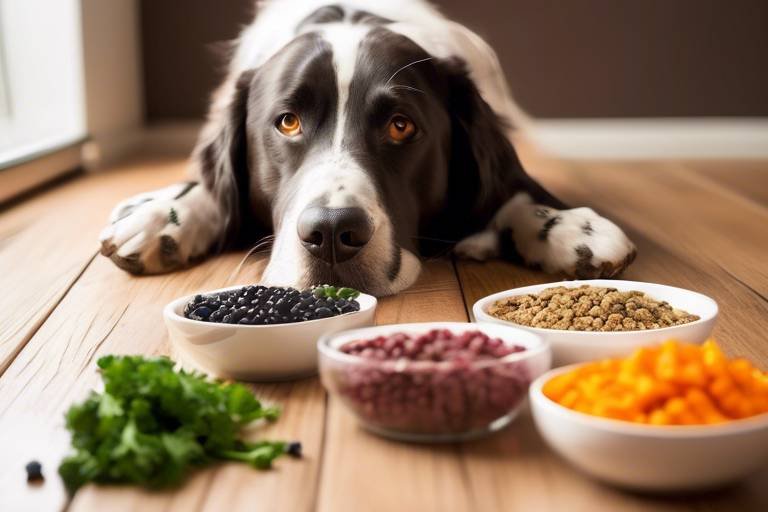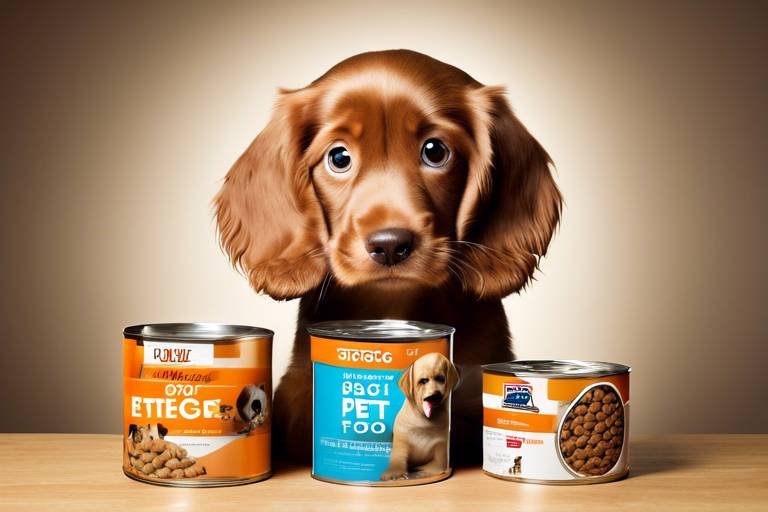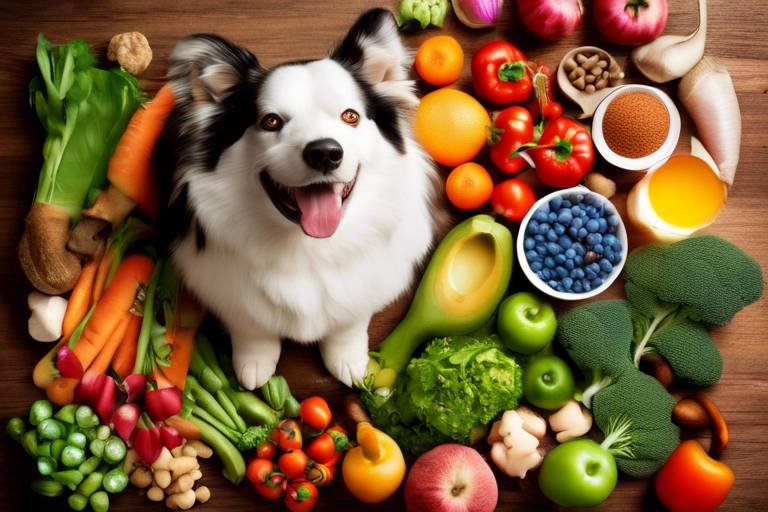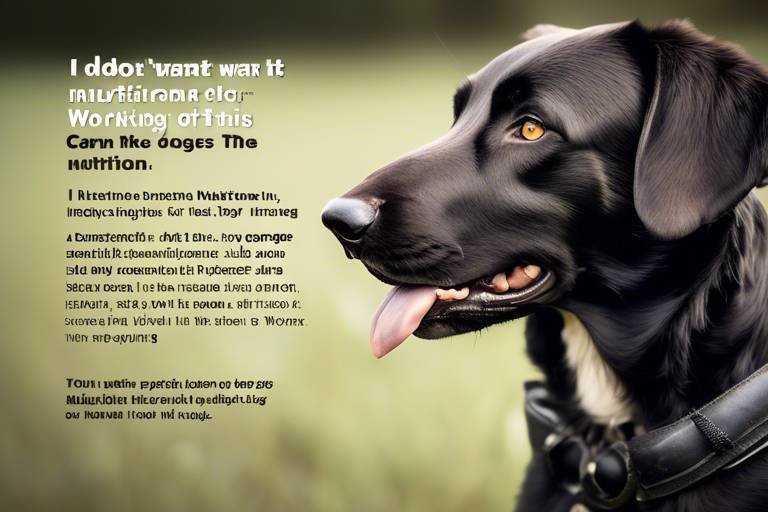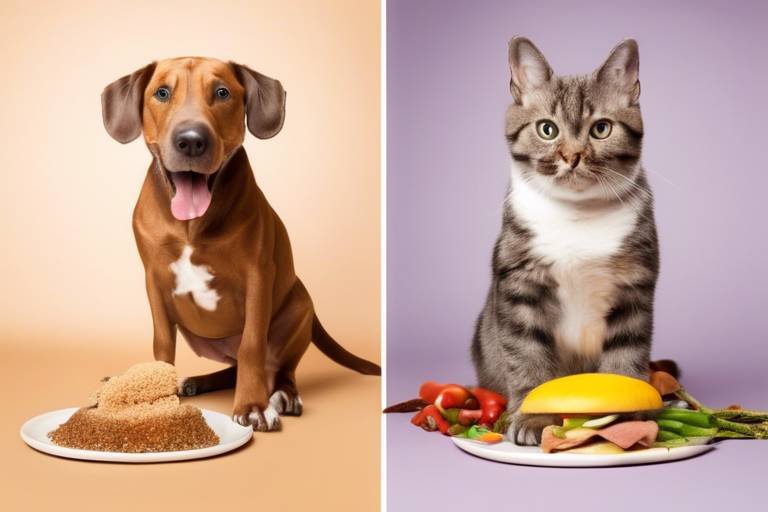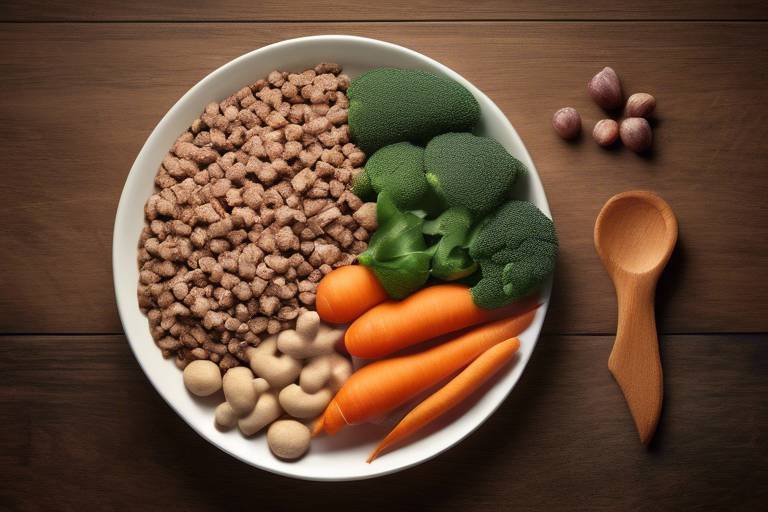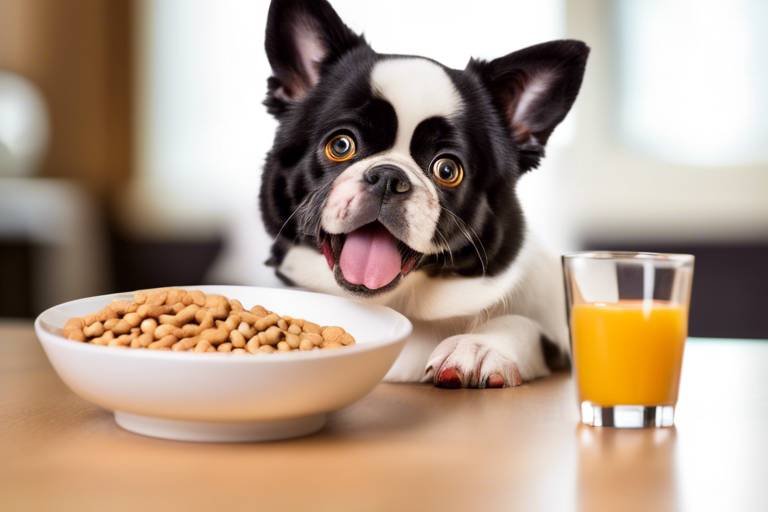The Benefits of Adding Superfoods to Pet Meals
As pet owners, we all want the best for our furry companions. Just like us, our pets thrive on a balanced diet filled with essential nutrients. But have you ever thought about superfoods? These nutrient-packed powerhouses can significantly enhance your pet's health, boost their immune system, and improve their overall well-being. In this article, we will explore the incredible benefits of incorporating superfoods into your pet's meals and provide practical tips to help you do just that.
Imagine your pet’s food bowl filled not just with regular kibble but with vibrant, colorful superfoods that can make a world of difference. From dogs to cats, every pet can benefit from these nutrient-dense foods. So, what exactly are superfoods? In the context of pet nutrition, superfoods refer to those ingredients that are exceptionally rich in vitamins, minerals, and antioxidants. They are like the superheroes of the food world, working tirelessly to keep your furry friends healthy and happy.
Why should you consider adding these superfoods to your pet's diet? Well, think of it this way: just as we feel more energetic and vibrant when we eat a well-rounded diet packed with nutrients, our pets feel the same! By incorporating superfoods, you can help combat common health issues, support their immune systems, and even improve their skin and coat health. It's like giving them a natural boost, right from their food bowl!
Now, let’s dive into some of the top superfoods for pets. For dogs, ingredients like blueberries and sweet potatoes are fantastic additions. Blueberries are rich in antioxidants, which can help fight off free radicals and support brain health. Sweet potatoes are an excellent source of dietary fiber and vitamins, promoting digestive health and keeping your dog feeling full and satisfied.
Cats, on the other hand, can benefit from superfoods like salmon and pumpkin. Salmon is packed with omega-3 fatty acids, which are essential for a shiny coat and healthy skin. Pumpkin, rich in fiber, can aid in digestion and help prevent hairballs. Incorporating these superfoods into your pet's meals is not only easy but also a fun way to enhance their diet.
But how exactly do superfoods boost immunity? The science behind it is fascinating! Many superfoods contain high levels of vitamins C and E, zinc, and other antioxidants that play a crucial role in strengthening your pet's immune system. These nutrients help fight off infections and diseases, ensuring your furry friend stays healthy and vibrant. By regularly including superfoods in their meals, you are essentially fortifying their body’s defenses against illnesses.
Good digestion is another critical aspect of your pet's health. Superfoods like chia seeds and probiotics can significantly improve digestive health. Chia seeds are loaded with fiber, which helps regulate bowel movements, while probiotics promote a healthy gut flora, ensuring your pet’s digestive system functions optimally. Think of it as giving your pet a little digestive army to keep everything running smoothly.
And let's not forget about skin and coat health! A shiny coat and healthy skin are often indicators of a well-nourished pet. Superfoods rich in omega-3 fatty acids, such as fish oil or flaxseed, can work wonders in maintaining skin hydration and reducing inflammation. By incorporating these ingredients into your pet’s diet, you are not just enhancing their appearance but also their overall health.
However, it’s essential to choose the right superfoods for your pet. Not every superfood is suitable for every animal, so it’s crucial to consider your pet's specific needs, age, and any dietary restrictions they may have. Consulting with your veterinarian can provide valuable insights into which superfoods will be most beneficial for your furry friend.
Finally, let’s talk about practical ways to incorporate superfoods into your pet's meals. You can easily add superfoods by mixing them into their regular food or creating homemade treats. For example, you can blend blueberries into a smoothie for your dog or mix pumpkin puree into your cat's wet food. The options are endless, and your pets will love the added flavor and nutrition!
In conclusion, adding superfoods to your pet's diet is a simple yet effective way to enhance their health, boost their immune system, and improve their overall well-being. By being mindful of the superfoods you choose and how you incorporate them, you can ensure your furry friends lead happy and healthy lives. So, why not give it a try? Your pets will thank you for it!
- What are superfoods for pets? Superfoods are nutrient-rich foods that provide health benefits, helping to enhance your pet's diet.
- Can I give my dog blueberries? Yes! Blueberries are safe and beneficial for dogs, packed with antioxidants.
- Are there superfoods specifically for cats? Absolutely! Salmon and pumpkin are great superfood options for cats.
- How can I add superfoods to my pet's diet? You can mix superfoods into their meals or use them in homemade treats.

Understanding Superfoods for Pets
When we think of superfoods, we often picture vibrant fruits and vegetables that pack a nutritional punch for humans. But did you know that our furry friends can also benefit from these nutrient-dense foods? In the context of pet nutrition, superfoods are defined as those ingredients that are exceptionally rich in vitamins, minerals, and antioxidants, offering significant health benefits to our pets. Just like a superhero swooping in to save the day, these foods can enhance your pet's overall well-being, making them an essential part of a balanced diet.
So why are superfoods so crucial for our pets? Just like us, pets need a variety of nutrients to thrive. A well-rounded diet helps maintain their energy levels, supports their immune system, and promotes healthy skin and coat. Incorporating superfoods into your pet's meals can be a game-changer. Imagine giving your dog a boost of energy with a handful of blueberries or ensuring your cat has a shiny coat thanks to some salmon. It's like giving them a little extra magic in their bowl!
Superfoods are not just about the nutrients; they also play a role in preventing diseases. For instance, many superfoods contain antioxidants that combat free radicals in the body, which can lead to chronic diseases. By including these foods in your pet's diet, you’re not just feeding them; you’re also helping to fortify their defenses against illness. With so many benefits packed into these tiny morsels, it’s hard to overlook their importance.
Let’s take a closer look at what makes a food a superfood. Typically, superfoods for pets are:
- Nutrient-rich: They contain a higher concentration of vitamins and minerals compared to regular pet food.
- Antioxidant-packed: They help fight oxidative stress and support overall health.
- Natural: Most superfoods are whole foods, free from artificial additives and preservatives.
As we explore the world of superfoods, it’s essential to understand that not all superfoods are created equal. Some might be fantastic for dogs but not suitable for cats, and vice versa. Therefore, knowing which superfoods to incorporate based on your pet's specific needs is vital. This understanding can lead to a healthier, happier life for your beloved companions.
In summary, superfoods are a powerful addition to your pet's diet, offering numerous health benefits that can enhance their quality of life. By understanding what superfoods are and how they function, you can make informed choices that will help your furry friends thrive!

Top Superfoods for Dogs
When it comes to our canine companions, their health is often our top priority. One way to ensure that your dog thrives is by incorporating superfoods into their diet. But what exactly are these superfoods, and why are they so beneficial? Superfoods are typically nutrient-dense foods that provide a multitude of health benefits, and they can significantly enhance your dog's overall well-being. Let’s dive into some of the top superfoods that can make a world of difference for your furry friend.
First on the list is the humble blueberry. These tiny, vibrant fruits are not only delicious but packed with antioxidants. Blueberries can help combat oxidative stress and may even improve cognitive function in older dogs. Imagine giving your dog a treat that not only tastes great but also helps keep their mind sharp! You can easily add blueberries to your dog's meals, whether fresh, frozen, or even in homemade treats.
Next up is the sweet potato, a fantastic source of dietary fiber and vitamins. Sweet potatoes are rich in beta-carotene, which can support healthy vision and boost the immune system. They can be served mashed, baked, or dehydrated into crunchy treats. Not only do they provide essential nutrients, but dogs also love their naturally sweet flavor!
Another superfood worth mentioning is spinach. This leafy green is a powerhouse of vitamins A, C, and K, along with iron and antioxidants. Spinach can help improve your dog's overall health by supporting their immune system and promoting healthy skin. Just remember to cook it lightly before serving, as raw spinach contains oxalic acid, which can interfere with calcium absorption in large amounts.
Don’t overlook the benefits of salmon. This fish is not only a great protein source but is also rich in omega-3 fatty acids, which are crucial for maintaining a shiny coat and healthy skin. Omega-3s can also help reduce inflammation and support heart health. When adding salmon to your dog's diet, ensure it is cooked and boneless to avoid any choking hazards. You might even consider making homemade salmon treats!
Finally, let’s talk about chia seeds. These tiny seeds are a nutritional powerhouse, packed with omega-3 fatty acids, fiber, protein, and various essential minerals. Chia seeds can help improve digestion and support healthy skin and coat. Just sprinkle a teaspoon of them over your dog's food, and watch them enjoy this crunchy addition!
Incorporating these superfoods into your dog's diet can be a game-changer. Not only do they provide essential nutrients, but they also keep mealtime exciting for your furry friend. However, it's essential to introduce any new food gradually and consult your veterinarian, especially if your dog has any dietary restrictions or health issues.
In summary, adding superfoods like blueberries, sweet potatoes, spinach, salmon, and chia seeds can greatly enhance your dog's health. These foods are not just nutritious; they can also make your dog’s meals a lot more enjoyable. So why not give them a try? Your pup will thank you for it!
- What are superfoods for dogs? Superfoods are nutrient-rich foods that provide health benefits, such as antioxidants, vitamins, and minerals, that can enhance your dog's overall well-being.
- How can I incorporate superfoods into my dog's diet? You can add superfoods by mixing them into your dog's regular meals or making homemade treats. Always introduce new foods gradually.
- Are all superfoods safe for dogs? Not all superfoods are suitable for every dog. It's crucial to consult your veterinarian about which superfoods are appropriate for your pet's specific needs.
- Can superfoods help with my dog's skin and coat health? Yes! Many superfoods, such as salmon and chia seeds, are rich in omega-3 fatty acids, which promote healthy skin and a shiny coat.

Top Superfoods for Cats
When it comes to keeping our feline friends healthy and happy, superfoods play a crucial role. Just like humans, cats can benefit tremendously from nutrient-dense foods that pack a punch in terms of health benefits. So, what are the top superfoods that can elevate your cat's diet? Let’s dive into some of the best options that can make your kitty purr with delight!
First on the list is salmon. This fish is not only a tasty treat for most cats but is also loaded with omega-3 fatty acids. These essential fats are vital for maintaining a shiny coat and healthy skin, while also supporting heart health. Imagine your cat strutting around with a coat so shiny it could rival a polished car! Plus, the anti-inflammatory properties of salmon can help reduce joint pain, making it an excellent choice for older cats.
Next up is pumpkin, a superfood that is often overlooked. This humble vegetable is a fantastic source of fiber, which aids in digestion and helps prevent hairballs—a common nuisance for our furry companions. Pumpkin is also rich in vitamins A and C, which are essential for maintaining a healthy immune system. You can easily add a spoonful of pureed pumpkin to your cat's meals, and they’ll likely gobble it up without a second thought!
Another fantastic addition to your cat's diet is blueberries. These tiny berries are packed with antioxidants that can help combat oxidative stress and may even reduce the risk of chronic diseases. Not only are they a superfood, but they also add a burst of flavor that can make your cat's meals more exciting. Just toss a few blueberries into their bowl, and watch them enjoy a fruity feast!
Let’s not forget about spinach, which is another green powerhouse that can benefit your cat. Spinach is loaded with vitamins and minerals, including iron and calcium, which are essential for overall health. However, it's important to note that while spinach is safe for most cats, those with kidney issues should avoid it due to its oxalate content. Always consult your vet if you're unsure!
Lastly, consider adding chia seeds to your cat's diet. These tiny seeds may be small, but they are packed with nutrients like fiber, protein, and omega-3 fatty acids. They can be sprinkled over your cat's food or mixed into homemade treats. Just remember to soak them in water beforehand, as this will help them expand and become more digestible for your cat.
Incorporating these superfoods into your cat's diet can be both fun and beneficial. You can create a balanced meal plan that includes a variety of these ingredients. However, it’s essential to introduce new foods gradually to avoid any digestive upset. Remember, a happy cat is a healthy cat, and with these superfoods, you can ensure that your feline friend is getting the best nutrition possible!
| Superfood | Key Benefits |
|---|---|
| Salmon | Rich in omega-3 fatty acids, promotes healthy skin and coat, supports heart health |
| Pumpkin | Aids digestion, rich in fiber, prevents hairballs, boosts immune system |
| Blueberries | Packed with antioxidants, may reduce chronic disease risk |
| Spinach | High in vitamins and minerals, supports overall health |
| Chia Seeds | Rich in fiber and protein, good source of omega-3 fatty acids |

How Superfoods Boost Immunity
Superfoods are not just a trendy buzzword; they are powerful allies in enhancing your pet's immune system. Imagine your furry friend as a knight in shining armor, ready to battle against the pesky invaders of illness and disease. Superfoods act as the secret weapons in their arsenal, providing essential nutrients that fortify their defenses. But how do these magical ingredients work their wonders?
At the core of superfoods' immunity-boosting properties are antioxidants, vitamins, and minerals. These nutrients play a crucial role in protecting your pet's body from oxidative stress and inflammation. For instance, ingredients like blueberries and spinach are packed with antioxidants that help neutralize free radicals—those sneaky little culprits that can wreak havoc on your pet's health.
Moreover, certain superfoods are rich in omega-3 fatty acids, which are known to reduce inflammation and promote overall health. Think of omega-3s as the soothing balm that calms the raging fires of inflammation, helping your pet maintain a strong immune response. Foods such as salmon and chia seeds are excellent sources of these beneficial fats, making them fantastic additions to your pet's diet.
To further illustrate the impact of superfoods on immunity, here’s a quick overview of some top contenders:
| Superfood | Key Nutrients | Immune Benefits |
|---|---|---|
| Blueberries | Antioxidants, Vitamin C | Boosts overall immune function |
| Spinach | Vitamins A, C, and E | Supports cellular health and immunity |
| Salmon | Omega-3 fatty acids, Vitamin D | Reduces inflammation, enhances immune response |
| Chia Seeds | Omega-3s, Fiber | Aids digestion, promotes gut health |
In addition to direct immune support, superfoods also contribute to a healthy gut microbiome. A balanced gut is essential for optimal immune function, as approximately 70% of your pet's immune system resides in their digestive tract. By incorporating superfoods like probiotics from yogurt or fermented foods, you can help maintain a thriving population of beneficial bacteria that not only aids digestion but also strengthens the immune system.
So, how can you ensure your pet reaps the benefits of these immunity-boosting superfoods? It’s all about balance and variety. Mixing a range of these nutrient-dense foods into their meals can create a powerhouse of health benefits. Remember, though, not all superfoods are suitable for every pet. Always consult with your veterinarian before making significant changes to your pet's diet, especially if they have specific health concerns or dietary restrictions.
In summary, incorporating superfoods into your pet's meals is like giving them a shield against illness. With the right mix of antioxidants, omega-3s, and probiotics, you can empower your furry friend to face the world with a robust immune system. After all, a healthy pet is a happy pet!
- What are superfoods? Superfoods are nutrient-rich foods that provide health benefits beyond basic nutrition.
- Can all pets eat the same superfoods? No, different pets have different dietary needs. It's essential to choose superfoods that are appropriate for your pet's species, age, and health status.
- How can I incorporate superfoods into my pet's diet? You can mix superfoods into their regular meals, create homemade treats, or even find commercial pet foods that include superfoods.
- Are there any superfoods that are harmful to pets? Yes, some foods that are healthy for humans can be toxic to pets, such as grapes, onions, and chocolate. Always research before introducing new foods.

Improving Digestion with Superfoods
When it comes to our beloved pets, good digestion is as essential as a warm cuddle on a chilly evening. Just like us, pets can suffer from digestive issues, which can lead to discomfort and health problems. Luckily, incorporating superfoods into their diet can make a world of difference. Superfoods are not just a trendy buzzword; they are nutrient-dense foods that can help your furry friends maintain a healthy digestive system.
One of the standout superfoods for improving digestion is chia seeds. These tiny powerhouses are packed with fiber, which is crucial for regular bowel movements. Fiber acts like a broom in the digestive tract, sweeping away waste and keeping things moving smoothly. For dogs and cats alike, adding a teaspoon of chia seeds to their meals can promote gut health and prevent constipation. Imagine chia seeds as tiny superheroes, swooping in to save the day!
Another fantastic option is probiotics. These beneficial bacteria are essential for a balanced gut microbiome. Just like a bustling city, our pets' intestines thrive when they have a healthy population of good bacteria. Probiotics can help break down food, absorb nutrients, and fend off harmful bacteria. You can find probiotics in various forms, including supplements and fermented foods like plain yogurt. Just a dollop of yogurt can transform your pet's meal into a digestive delight!
It's important to note that not all pets are the same, and their digestive systems can vary widely. Therefore, it’s crucial to introduce these superfoods gradually. Start with small amounts and observe how your pet reacts. If they seem to enjoy the new additions without any tummy troubles, you can slowly increase the quantity. Think of it as introducing a new flavor to your own diet—you wouldn’t want to dive into a spicy dish without a little taste test first!
For those looking to mix things up, consider adding pumpkin to your pet's meals. This vibrant orange superfood is not only delicious but also loaded with fiber and moisture. Pumpkin can help regulate digestion, making it an excellent choice for pets with both constipation and diarrhea. Plus, it’s a great way to add some color to your pet’s bowl, making mealtime more exciting! Just be sure to use plain, canned pumpkin without any added sugars or spices.
To wrap it all up, superfoods like chia seeds, probiotics, and pumpkin can significantly enhance your pet's digestive health. Not only do they provide essential nutrients, but they also help alleviate common gastrointestinal issues, ensuring your furry friend feels their best. So, why not give these superfoods a try? Your pet's tummy will thank you!
Q: How do I know if my pet needs digestive support?
A: Signs that your pet may need digestive support include irregular bowel movements, bloating, gas, or lack of appetite. If you notice these symptoms, it’s best to consult your veterinarian.
Q: Can I give my pet human food as superfoods?
A: Yes, many human foods can be superfoods for pets, such as pumpkin, sweet potatoes, and plain yogurt. However, always check with your vet to ensure the food is safe for your specific pet.
Q: How should I introduce superfoods to my pet's diet?
A: Introduce superfoods gradually to monitor your pet's reaction. Start with small amounts mixed into their regular food and increase the quantity as they adjust.

Superfoods for Healthy Skin and Coat
When it comes to our beloved pets, a shiny coat and healthy skin are not just about aesthetics; they are indicators of overall health and well-being. Just like us, pets require a balanced diet enriched with essential nutrients to maintain their skin and coat. This is where superfoods come into play! These nutrient-dense foods can provide the vitamins, minerals, and fatty acids that contribute to a vibrant, lustrous coat and supple skin.
One of the key players in promoting skin and coat health is omega-3 fatty acids. Found in superfoods like salmon and flaxseeds, omega-3s are known for their anti-inflammatory properties. They help to reduce itching and flaking, which can be particularly beneficial for pets suffering from skin allergies or conditions like dermatitis. Imagine omega-3s as a soothing balm, calming the skin from within and giving your pet that enviable shine.
Another fantastic superfood for skin and coat health is sweet potatoes. These vibrant orange tubers are packed with beta-carotene, which the body converts into vitamin A. This vitamin is crucial for skin repair and regeneration. Including sweet potatoes in your pet's diet is like giving them a natural boost of nourishment that helps keep their skin hydrated and their coat glossy.
Additionally, pumpkin is another superfood that deserves a spotlight. Not only is it rich in vitamins A, C, and E, but it also contains antioxidants that combat free radicals, which can damage skin cells. The fiber in pumpkin aids digestion, ensuring that your pet absorbs all the nutrients they need for healthy skin and fur. Think of pumpkin as a superhero for your pet’s skin, fighting off the villains of dryness and irritation!
To help you visualize the benefits of these superfoods, here’s a simple table summarizing their key contributions:
| Superfood | Key Benefits |
|---|---|
| Salmon | Rich in omega-3 fatty acids; reduces inflammation and promotes a shiny coat. |
| Sweet Potatoes | High in beta-carotene; supports skin repair and hydration. |
| Pumpkin | Loaded with vitamins A, C, and E; contains antioxidants for skin health. |
Incorporating these superfoods into your pet's diet can be as simple as adding a spoonful of mashed pumpkin or sweet potato to their meals. For those pets who may be picky eaters, mixing these ingredients into their regular food can help mask the new flavors while still providing the health benefits. Remember, a little goes a long way! Start with small portions and gradually increase as your pet adjusts.
Ultimately, keeping your pet's skin and coat healthy is not just about their appearance; it’s about their overall health. By enriching their diet with superfoods, you’re investing in their happiness and longevity. So, why not treat your furry friend to the goodness of superfoods? They’ll thank you with wagging tails and purring cuddles!
Q: How often should I incorporate superfoods into my pet's diet?
A: It depends on your pet's individual needs, but a few times a week is a good start. Always consult with your veterinarian for personalized advice.
Q: Can I give my pet too much of these superfoods?
A: Yes, moderation is key! Too much of anything can upset your pet's stomach. Start with small amounts and monitor their reaction.
Q: Are there any superfoods I should avoid for my pet?
A: Yes, some foods that are superfoods for humans, like chocolate and grapes, can be toxic to pets. Always research or consult your vet before introducing new foods.

Choosing the Right Superfoods
When it comes to enhancing your pet's diet with superfoods, the choices can feel overwhelming. Just like humans, pets have unique nutritional needs that can vary based on their breed, age, size, and health conditions. So, how do you navigate this jungle of options? First, it's essential to understand that not all superfoods are created equal, and what benefits one pet might not be suitable for another. Think of it like choosing a personalized wardrobe; what looks great on one person might not fit another!
Start by assessing your pet's specific needs. For instance, if your dog is a senior with joint issues, incorporating superfoods rich in anti-inflammatory properties, such as turmeric or blueberries, could be beneficial. On the other hand, a young, energetic puppy may thrive on superfoods that boost their energy levels and support healthy growth, like sweet potatoes or quinoa. You wouldn't dress your toddler in adult clothes, right? The same principle applies to choosing superfoods for your furry friends!
Another critical factor to consider is any dietary restrictions your pet may have. Some pets can be sensitive to certain ingredients, just like some people have allergies. Always consult your veterinarian before introducing new superfoods into their diet, especially if your pet has a history of food allergies or gastrointestinal issues. This step is crucial to ensure that the superfoods you choose will nourish rather than upset their systems.
To help you make informed decisions, here's a quick breakdown of some popular superfoods and their benefits:
| Superfood | Benefits | Best For |
|---|---|---|
| Blueberries | Rich in antioxidants, supports brain health | Dogs |
| Salmon | High in omega-3 fatty acids, promotes healthy skin | Cats |
| Sweet Potatoes | Great source of fiber and vitamins, aids digestion | Dogs |
| Pumpkin | Supports digestive health, rich in vitamins | Cats |
| Chia Seeds | High in fiber and omega-3s, promotes heart health | Both |
Once you've identified the right superfoods for your pet, the next step is to incorporate them into their meals gradually. Start with small amounts to see how your pet reacts. Remember, the goal is to enhance their diet, not to create a culinary revolution overnight! Mixing a teaspoon of pumpkin into their usual food or offering a few blueberries as a treat can be a great start.
Lastly, keep an eye on your pet's overall health and behavior after introducing superfoods. Are they more energetic? Is their coat shinier? These are positive signs that you're on the right track! If you notice any adverse reactions, such as digestive upset or allergies, don't hesitate to revert to their previous diet and consult your vet. Just like we often tweak our diets based on how we feel, pets may need adjustments too!

Incorporating Superfoods into Pet Meals
Incorporating superfoods into your pet's meals can feel like a daunting task, but it doesn't have to be! Imagine transforming your furry friend's diet into a treasure trove of nutrients that not only enhance their health but also tantalize their taste buds. The key is to start small and make gradual changes that your pet will embrace. Begin by introducing one superfood at a time to see how your pet reacts. This way, you ensure they enjoy the new flavors while reaping the benefits of these nutritional powerhouses.
One of the simplest ways to incorporate superfoods is by mixing them into your pet's regular food. For instance, if you're adding blueberries, you can mash them up and mix them with their kibble or wet food. Dogs and cats alike are often curious about new smells and textures, so this can be an exciting experience for them. You might even find that they start to look forward to mealtime more than ever!
Another great method is to create homemade treats using superfoods. Think of it as baking for your best friend! You can whip up delicious treats using ingredients like pumpkin, oats, and peanut butter (make sure it's xylitol-free!). Not only will your pets love the taste, but you'll also have the satisfaction of knowing exactly what goes into their treats. Here’s a simple recipe to get you started:
Simple Pumpkin Dog Treats - 1 cup canned pumpkin (not the spiced pie filling) - 2 1/2 cups whole wheat flour - 1/2 cup peanut butter - 1/2 cup water Instructions 1. Preheat your oven to 350°F (175°C). 2. In a large bowl, mix the pumpkin, peanut butter, and water. 3. Gradually add the flour until a dough forms. 4. Roll out the dough and cut it into shapes. 5. Bake for 20-25 minutes until firm. Let cool and serve!
When it comes to cats, incorporating superfoods can be just as delightful. You might try adding small pieces of cooked salmon or a sprinkle of chia seeds on their food. Cats are often more finicky than dogs, so it’s essential to introduce new foods in small amounts to avoid overwhelming them. Monitoring their reaction is crucial; if they seem to enjoy it, you can gradually increase the quantity.
Don’t forget about the power of smoothies! Yes, you read that right. You can blend superfoods with some water or low-sodium broth to create a nutritious drink. Pour a little over your pet's food, and watch them lick their bowl clean. Some excellent ingredients for pet smoothies include spinach, blueberries, and bananas. Just ensure that any fruits or vegetables you use are safe for your specific pet.
Lastly, always consult with your veterinarian before making significant changes to your pet’s diet. They can provide personalized advice based on your pet’s health status, age, and dietary needs. Remember, not all superfoods are suitable for every pet, and your vet can help you navigate any potential allergies or sensitivities.
In summary, incorporating superfoods into your pet's meals is a fun and rewarding journey. With a little creativity and the right approach, you can enhance your pet's diet while keeping mealtime exciting. So, why not start today? Your furry friend will thank you with wagging tails and purring cuddles!
Q: Can I use human superfoods for my pets?
A: Yes, many human superfoods are safe for pets, but always check for any specific allergies or sensitivities your pet may have.
Q: How often should I introduce superfoods to my pet's diet?
A: Start with small amounts a few times a week, and monitor your pet's reaction before increasing the frequency.
Q: Are there any superfoods that are harmful to pets?
A: Yes, some foods like chocolate, grapes, and onions are toxic to pets. Always research or consult a vet before introducing new foods.
Q: Can superfoods replace my pet's regular food?
A: Superfoods should complement your pet's regular diet, not replace it. They add nutritional value but should not substitute complete meals.
Frequently Asked Questions
- What are superfoods for pets?
Superfoods for pets are nutrient-dense foods that provide exceptional health benefits. They are packed with vitamins, minerals, and antioxidants that can enhance your furry friend's overall well-being, boost their immune system, and even improve their coat and skin health.
- Which superfoods are best for dogs?
Some of the top superfoods for dogs include blueberries, sweet potatoes, and spinach. These foods are rich in antioxidants and essential nutrients that support your dog's health, promoting better digestion and a stronger immune system. Plus, they can be easily incorporated into your dog's meals!
- Are there superfoods specifically for cats?
Absolutely! Cats can benefit from superfoods like salmon, pumpkin, and spinach. These ingredients are high in omega-3 fatty acids and fiber, which can help improve your cat's digestion and skin health, making them feel and look their best.
- How do superfoods boost my pet's immunity?
Superfoods contain powerful antioxidants and nutrients that help strengthen your pet's immune system. Ingredients like blueberries and kale are known to fight off free radicals, reducing inflammation and keeping your pet healthier and more resilient against diseases.
- Can superfoods improve my pet's digestion?
Yes, certain superfoods like chia seeds and probiotics can significantly improve your pet's digestive health. They help maintain a balanced gut flora and promote regular bowel movements, alleviating common gastrointestinal issues.
- What superfoods promote healthy skin and coat?
Superfoods rich in omega-3 fatty acids, such as salmon and flaxseed, are fantastic for maintaining healthy skin and a shiny coat. These nutrients can help reduce itching, dryness, and irritation, ensuring your pet looks great and feels comfortable.
- How do I choose the right superfoods for my pet?
When selecting superfoods for your pet, consider their specific needs, age, and any dietary restrictions they may have. It's always best to consult with your veterinarian to determine which superfoods will be most beneficial for your furry friend.
- What are some easy ways to incorporate superfoods into my pet's meals?
You can easily add superfoods to your pet's diet by mixing them into their regular food or creating homemade treats. For example, you can blend blueberries into a smoothie for dogs or mix pumpkin puree into cat food. Just be sure to introduce new foods gradually!

